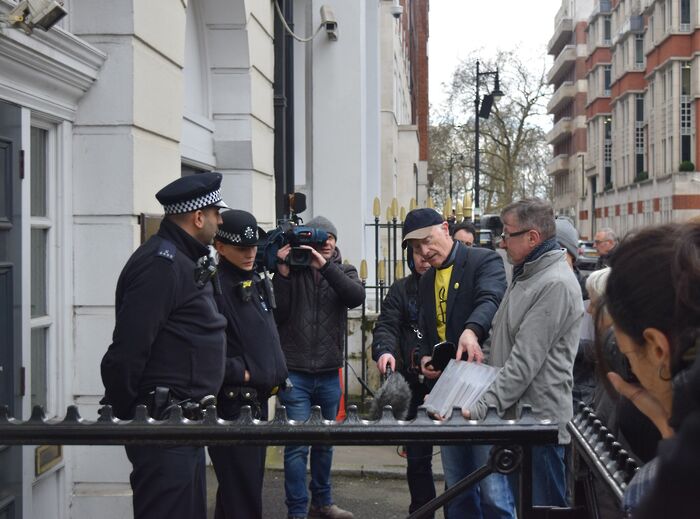Academics accuse universities of placing ‘profit before human rights’ in ties with Egypt
The open letter, signed by over 200 academics, references the 2016 murder of Cambridge PhD student Giulio Regeni

233 academics, including 31 from Cambridge, have signed a letter in The Guardian criticising agreements aimed at fostering collaboration between British and Egyptian higher education institutions.
The letter accused Universities UK (UUK) and the British government of overlooking authoritarianism and human rights abuses carried out by the Egyptian government. It specifically referenced the 2016 abduction, torture, and murder of Cambridge PhD student Giulio Regeni, a crime which many believe involved Egyptian authorities.
It also condemned “a much wider campaign of repression targeting the political opposition, trade unions, civil society, independent media, and the legal profession” in Egypt.
The letter was a response to the several Memoranda of Understanding (MoUs) – formal agreements which are generally not legally binding – which have been signed between British and Egyptian institutions to promote cooperation, including British universities establishing satellite campuses in Egypt. One such agreement was signed in January, when Egypt’s Prime Minister visited the UK, and another was signed in June, when a UUK delegation visited Egypt.
“This is just a cynical branding exercise”
Many of the signatories hailed from the Universities of Cambridge and Leeds, two UK universities where Giuilio Regeni studied. There was also a high number of signatories from the University of Liverpool, which recently signed an MoU with the Egyptian government and is currently exploring the possibility of opening a campus in Egypt.
According to Dr Anne Alexander, a member of Cambridge UCU and one of the authors of the open letter, it came about as “a joint initiative by UCU activists in Cambridge, Liverpool, UEA, Leeds and a number of other universities.
“We were united by anger that while the Egyptian security services are extremely likely to be the culprits in the murder and torture of Giulio Regeni, Universities UK seems happy to carry on ‘business as usual’ with the Sisi regime,” she added.
In keeping with previous issues raised by the UCU, the letter accused the MoUs of forming part of the “marketisation of higher education” and aiming to make “short-term profits.”
Another signatory of the open letter, Cambridge UCU Secretary Dr Waseem Yaqoob told Varsity: “It is disgraceful that little more than two years after Giulio’s murder, UUK are willing to do business as usual with an Egyptian government that continues to cover up the truth about our colleague and is mounting a vicious crackdown on Egyptian civil society.”
He added, “I hope that the University continues to support research students working on topics related to Egypt, while doing its utmost to ensure their security, and I hope that that Cambridge will extend whatever solidarity it can to our Egyptian academic colleagues facing grave threats to their academic freedom.”
The letter called the MoUs between UK universities and the Egyptian government “a cynical branding exercise: selling degrees with the imprimatur of a UK university, while remaining silent about the disappearance of academic critics and attacks on Egyptian students’ right to learn without fear.”
Responding to the letter, Vivienne Stern, director of Universities UK International, said, “The freedom academics have to conduct their work without state or political interference is fundamentally important to UK Universities and, we believe, an essential ingredient in excellent teaching and research. UK universities can contribute to the promotion of these values internationally in terms of sharing knowledge, encouraging debate and championing academic freedom.
“It is important that UK universities continue to engage internationally in education and research. Universities UK regularly reviews its partnerships with overseas entities and seeks advice from its board in the light of changing political and social circumstances.”
She affirmed that the murder of Giulio Regeni “has been raised, on numerous occasions, with various representatives of the Egyptian government” and also during the recent delegation of UK university leaders to Egypt.
A University of Liverpool spokesperson issued a similar statement: “The University of Liverpool is committed to global engagement, which we believe is fundamental to furthering education and research. Higher education has a vital role to play in upholding and progressing rights and academic freedom and these matters, together with the unresolved murder of Cambridge PhD student Giulio Regeni, were raised during the visit to Egypt.”
 News / SU reluctantly registers controversial women’s soc18 December 2025
News / SU reluctantly registers controversial women’s soc18 December 2025 Features / Should I stay or should I go? Cambridge students and alumni reflect on how their memories stay with them15 December 2025
Features / Should I stay or should I go? Cambridge students and alumni reflect on how their memories stay with them15 December 2025 News / Dons warn PM about Vet School closure16 December 2025
News / Dons warn PM about Vet School closure16 December 2025 News / Cambridge study finds students learn better with notes than AI13 December 2025
News / Cambridge study finds students learn better with notes than AI13 December 2025 News / Uni registers controversial new women’s society28 November 2025
News / Uni registers controversial new women’s society28 November 2025










